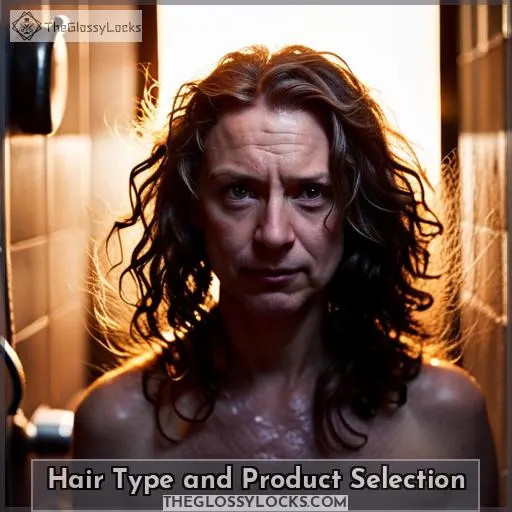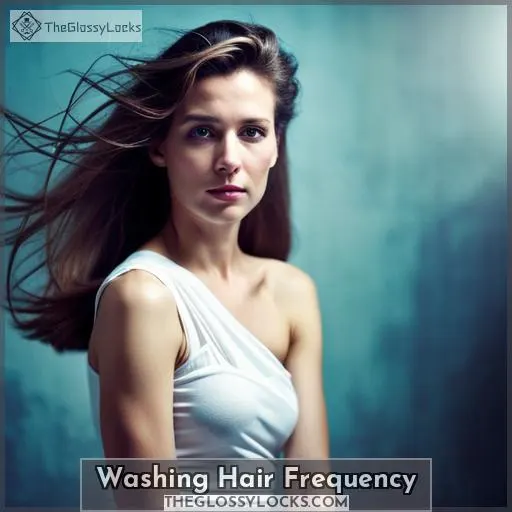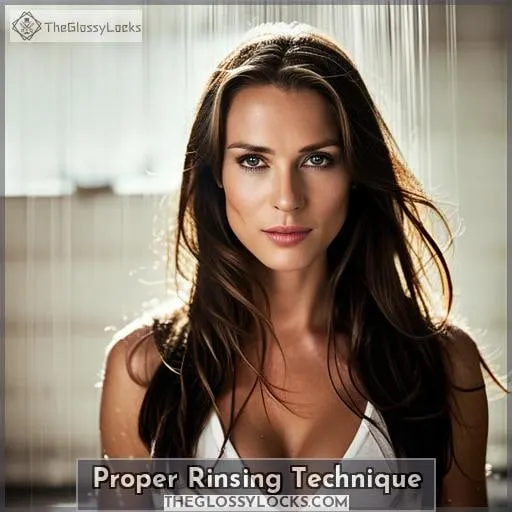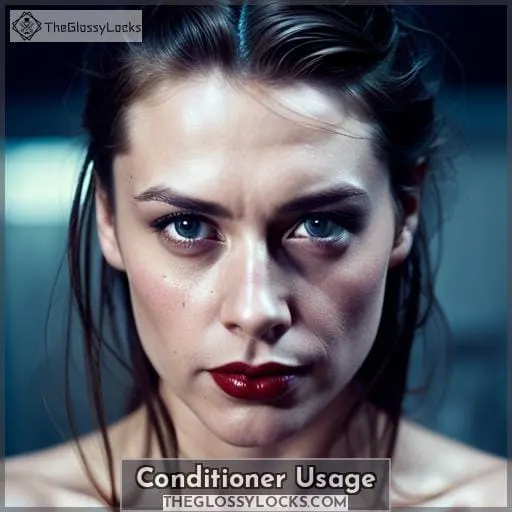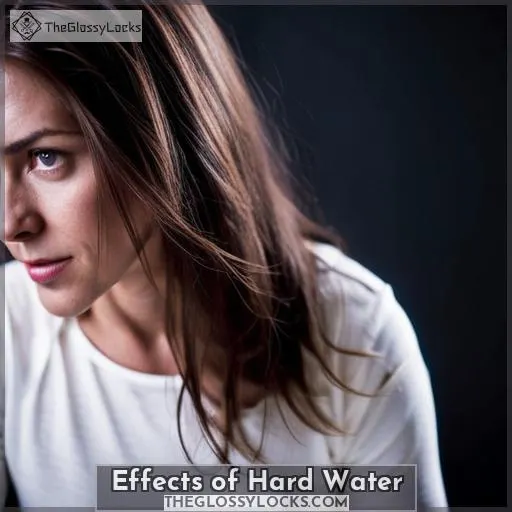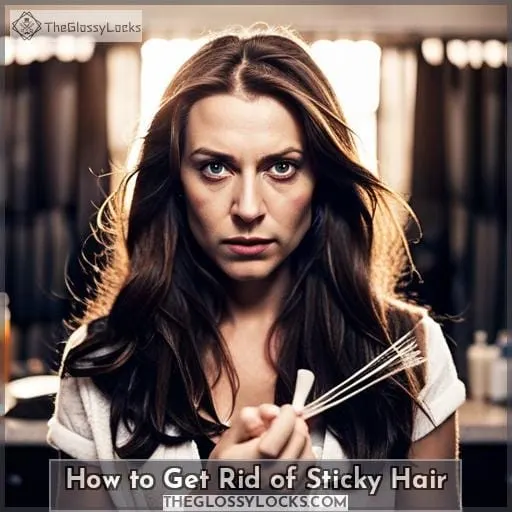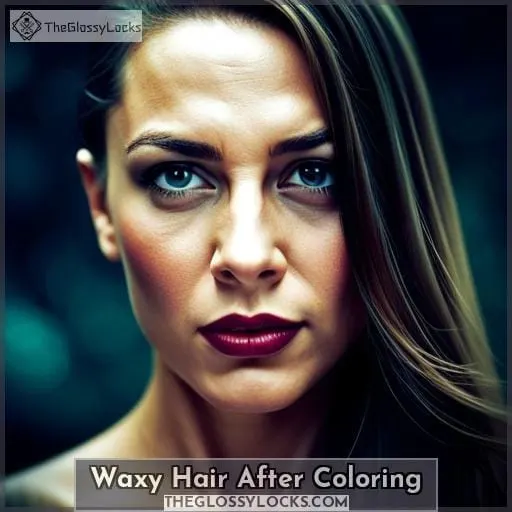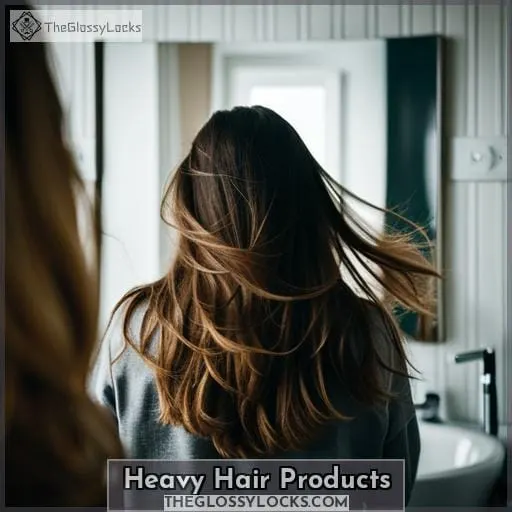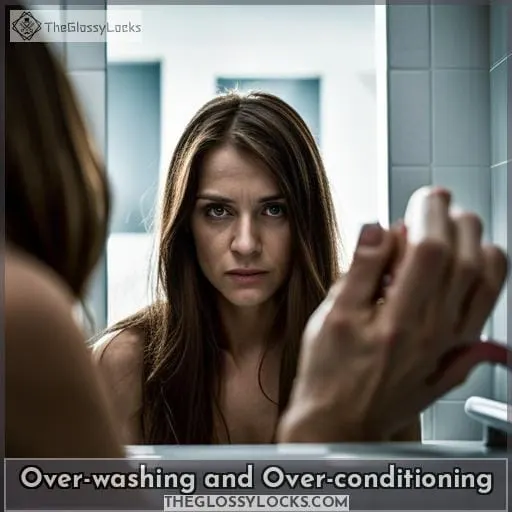This site is supported by our readers. We may earn a commission, at no cost to you, if you purchase through links.

Table Of Contents
- Key Takeaways
- Hair Type and Product Selection
- Washing Hair Frequency
- Proper Rinsing Technique
- Conditioner Usage
- Product Buildup
- Effects of Hard Water
- How to Get Rid of Sticky Hair
- Waxy Hair After Coloring
- Heavy Hair Products
- Over-washing and Over-conditioning
- Frequently Asked Questions (FAQs)
- How can I prevent my hair from feeling sticky after washing?
- What are some natural remedies for removing buildup from my hair?
- What are some good shampoos and conditioners for oily hair?
- What are some tips for washing my hair with hard water?
- How can I tell if my hair products are causing a sticky feeling?
- Conclusion
Key Takeaways
- Choose shampoos and conditioners suited for your hair type to avoid sticky residue.
- Check the ingredients for silicones, waxes, oils, and butters that may cause stickiness.
- Thoroughly rinse out the conditioner to remove any product residue.
- Limit washing your hair to 2-3 times per week to prevent buildup.
Hair Type and Product Selection
Choosing the right shampoo and conditioner for your hair type is key to avoiding sticky post-wash residue, so make sure you pick products that won’t weigh it down or cause buildup.
If you have naturally oily hair, look for shampoos and conditioners specifically designed for this type of hair in order to prevent overproduction of oil.
For fine-haired individuals, use a pea-sized amount of silicone-free conditioner as too much product can leave behind a waxy feeling after rinsing. Product buildup due to silicones not properly washed out can also lead to stickiness.
Invest in clarifying shampoos weekly if needed in order to remove excess product without overdrying the scalp.
Make sure you are washing with filtered water or using a water softener if hard water is an issue. Dirty brushes and towels transfer oils back into freshly cleansed strands, which will result in greasiness.
Chlorine from pools may also contribute towards stickiness due to the minerals left on strands once dried off completely.
Lastly, read reviews before choosing any new products as heavy waxes or butters often found within them could be weighing down already prone-to-oiliness types, resulting in sticky locks after showering sessions end!
Washing Hair Frequency
Wash your hair no more than 2-3 times a week to prevent excessive oil production and buildup that can lead to a sticky feeling. Overwashing strips the natural oils from your scalp, causing it to overproduce sebum, which will make your hair greasy and heavy.
If you have naturally oily hair, try skipping one wash day in between each shampooing session as this may help reduce stickiness after washing. Invest in water filters or softeners if you have hard water. Minerals left on the scalp could cause a build-up of product, which leads to a sticky residue after rinsing out conditioner.
Eating foods with high protein content, along with fruits and vegetables, can also improve the scalp’s overall health, resulting in less greasy feeling locks post wash day! Switch out waxy products for silicone-free alternatives so they don’t coat the strands, leaving behind an unwanted film when not washed thoroughly enough too.
Making some simple changes, such as adjusting diet, using the right products for specific needs, and ensuring thorough cleaning habits, are key points in attaining healthy, non-sticky locks long-term!
Proper Rinsing Technique
Rinse thoroughly after conditioning, ensuring all product residue is washed away to avoid a sticky post-wash feeling.
- Deep Conditioning: Properly deep condition hair before shampooing and conditioning in order to guard against dryness and breakage.
- Hair Porosity: Understand your hair’s porosity level as this affects the absorption of natural oils or buildup from products.
- pH Balance: Ensure you use shampoos with an appropriate pH balance for your scalp type as imbalances can lead to excessive oiliness or waxy buildup on the scalp.
- Water Softening: Invest in water softeners if hard water is causing mineral deposits which make it difficult for conditioner residues and other impurities to rinse out easily; alternatively, filtered showerheads will help eliminate excess minerals from tap water too!
- Natural Oils: Supplementation with natural oils such as avocado/coconut oil helps nourish the strands without weighing them down – leading towards a less ‘sticky’ feeling post wash day!
By following these guidelines closely, you can ensure your hair gets properly cleansed each time you wash while also avoiding any unwanted waxy buildup that leads towards an undesirable post-shower feel.
Conditioner Usage
Get the conditioner ratio right– don’t be a shampoo-skimping, conditioner-guzzling fool! Using too much of either can lead to sticky hair. Silicones in certain products can build up and cause that tacky feeling if not washed out thoroughly.
If you have hard water, consider investing in a shower filter or softener. Otherwise, minerals like chlorine may stick to your locks and leave them feeling gummy post-wash. Oily hair types are more prone to this issue. Use lighter products such as waxes or oils instead of heavy butters for styling purposes.
Opt for shampoos without sulfates, which strip away natural oils from the scalp and strands.
Eating an unhealthy diet full of fried foods high in sugar will also make your mane feel greasy after washing, so cut back on those bad habits if you want healthy locks! Also, avoid coloring treatments as they damage follicles, leaving behind waxy residue that’s difficult to rinse off completely.
Finally, don’t forget regular cleansing. Wash hair tools like combs and brushes often while keeping your pillowcases clean at all times for optimal results.
Product Buildup
Product buildup can cause hair to feel sticky after washing. To prevent this, it’s important to use cleaning tools such as combs and brushes regularly. If you are prone to oiliness, avoid using waxes, heavy oils, and butters in your hair products.
Using a water softener or filter for hard water can help ensure that your hair gets the proper cleansing it needs without leaving mineral deposits behind.
In addition, making changes to your diet may be necessary. It’s best to avoid foods high in sugar and fried items as they can contribute to greasy locks. Clarifying shampoos with activated charcoal or apple cider vinegar are great options for removing product buildup from the scalp without drying out your hair.
Lastly, try using silicone-free conditioners that won’t leave a waxy residue on your hair once rinsed off properly. However, be mindful of the amount of conditioner you use, as even an excess amount can weigh down fine hair types easily enough.
Effects of Hard Water
Hard water can leave mineral deposits on your scalp and in your hair, causing it to become gummy and sticky. This is due to the chlorine buildup that occurs when washing with hard water. To avoid this, you should use a filter or water softener for optimal results when washing your hair.
Scalp buildup from clogged pores also contributes to the feeling of greasiness after shampooing with hard water. Overwashing strips natural oils, which causes an overproduction of oil by the scalp. Hot water can lead to dehydration, creating waxy buildup on top of already existing residue from styling products like hairspray or gel.
Using shampoos designed for removing buildup will help rinse away minerals without overdrying so that locks remain hydrated without any sticky residues left behind. Botanical shampoos are great since they cleanse gently yet effectively. Charcoal-based ones are ideal if looking for something stronger but still gentle enough not to damage delicate strands, while keratin treatments provide extra strength conditioning benefits too! Apple Cider Vinegar (ACV) is another good option – its acidity naturally cleanses dirt off strands, leaving locks fresh smelling again! Finally, using a shower filter or regular clarifying shampoos weekly ensures all impurities have been removed before styling day arrives again, ready to take center stage once more.
How to Get Rid of Sticky Hair
To reduce sticky hair, try using a silicone-free conditioner and shampoo suited to your hair type. It’s important to limit washing to 2-3 times per week. Rinse thoroughly after conditioning and use only a pea-sized amount of conditioner for fine hair.
Here are some tips you can follow:
- Invest in water softeners or shower filters if you have hard water.
- Avoid waxes, heavy oils, and butters in products if you’re prone to oiliness.
- Consume a protein-rich diet instead of fried or sugary food. These can clog scalp pores and cause buildup.
- Use natural ingredients like avocado or coconut oil. They nourish without weighing down the locks. Charcoal and keratin shampoos keep the hair clean. Clarifying shampoos should be used weekly to remove buildup from dirt, sweat residue, chlorine, and mineral deposits from pools and heat styling tools.
Excessive use of styling products can lead to product buildup, causing the hair to feel sticky, and using a clarifying shampoo can help remove this buildup, try understanding more about why does my hair feel waxy. These can make the hair feel waxy and gummy after washing, which can be uncomfortable when combing through the hair.
If all these steps fail, visit a doctor to check for underlying skin issues such as seborrheic dermatitis.
Waxy Hair After Coloring
Coloring your hair can leave it feeling waxy and tacky, like you’re walking on eggshells. Chemical processing damage is usually the cause, with harsh coloring agents leaving residue behind that clogs pores.
To start tackling this problem, look for shampoos that are silicone-free to help reduce buildup from styling products and conditioners. Eating a balanced diet full of protein, fruits, and vegetables can also nourish hair while avoiding pore-clogging foods such as dairy or fried fare will help keep the scalp cleanse naturally without stripping oils away too quickly.
Installing a water softener or filter if you have hard water may be beneficial in reducing mineral deposits which contribute to grease buildup.
Heavy Hair Products
Heavy products like oils and butters can weigh down your hair if they are not properly rinsed out, leaving it with a sticky feeling after washing. To prevent this, naturally oily hair types should use shampoos and conditioners tailored to their needs.
Oil-based products may require more frequent shampooing—just 2–3 times per week—and thorough rinsing is necessary for all cleansers.
Investing in water softeners or shower filters will help remove minerals that create buildup on the scalp and strands. For those dealing with product buildup caused by heavy styling creams or waxes, weekly clarifying shampoos are recommended to break down residue left behind without drying out the scalp too much.
To condition fine hair textures, use only a pea-sized amount of conditioner. Choose silicone-free products since silicones cause stickiness if not washed away completely. Incorporate dietary changes such as reducing sugary snacks and fried foods to improve overall scalp health, leading to healthier locks over time.
Investing in water softeners or shower filters can also help reduce mineral deposits that clog pores and create buildup.
Over-washing and Over-conditioning
Overshampooing and overconditioning can lead to sticky, heavy hair. It’s important to limit washing your hair 2-3 times per week in order to minimize product buildup and avoid dryness or damage.
Too much conditioner will add time for proper rinsing, so it’s best not to use more than a pea-sized amount of product each time you wash.
Furthermore, chlorine in pools has been known to cause damage leading up to the sticky feeling after shampooing. Unhealthy diets high in sugar and fried foods can also contribute by clogging pores on the scalp, resulting in an accumulation of buildup that makes your tresses feel stuck together when washed too frequently or with overconditioning products like silicones, which are hard to remove from the hair’s surface without specialized shampoos created for this purpose.
To prevent stickiness, opt for lifestyle choices that promote healthier locks. This includes investing in shower filters or water softeners if you have hard water, using clarifying shampoos weekly, avoiding waxes, heavy oils, and butters, eating a protein-rich diet full of fruits and vegetables, cleansing brushes regularly, changing pillowcases frequently, and using natural shampoos made with botanicals instead of harsh chemicals.
Taking these steps allows you to maintain healthy-looking hair while avoiding any undesirable post-wash results!
Frequently Asked Questions (FAQs)
How can I prevent my hair from feeling sticky after washing?
To prevent your hair from feeling sticky after washing, try using a shampoo and conditioner suited to your hair type, limit washes to 2-3 times per week, and rinse thoroughly. For example, switch out heavy oils for natural products like avocado or coconut oil, which nourish without weighing down.
What are some natural remedies for removing buildup from my hair?
To remove buildup from your hair naturally, try using an apple cider vinegar shampoo and avocado/coconut oil conditioner. Clarifying shampoos can help too, but be sure to nourish with a healthy diet full of protein and veggies.
Regularly clean combs, brushes, and tools – this will keep oils at bay! With the right products, you’ll enjoy clean hair without residue or stickiness.
What are some good shampoos and conditioners for oily hair?
Look for conditioners and shampoos with natural ingredients to nourish oily hair. Avoid heavy products, silicone-based formulas, and sulfates that can build up on your scalp.
What are some tips for washing my hair with hard water?
Invest in a shower filter or water softener to reduce hard minerals and chlorine in your water. Use clarifying shampoos weekly to remove buildup, but avoid over-washing, which strips natural oils. Choose shampoos/conditioners suited for your hair type and use only pea-sized amounts of conditioner.
Regularly clean brushes, combs, and towels to prevent oil transfer back onto hair.
How can I tell if my hair products are causing a sticky feeling?
Check the ingredients of your products and look for silicones, waxes, heavy oils, or butters. Read reviews to see if other users experienced a sticky feeling with the product. Clarifying shampoos can help remove buildup without overdrying. Avoid overusing conditioner and apply it only to the ends of hair strands.
Rinse thoroughly after washing as any residue left on the scalp could cause stickiness when dry.
Conclusion
It’s normal to feel frustrated when your hair feels sticky after washing. However, with the right knowledge and dedication, it doesn’t have to be a long-term issue.
By understanding the causes, like improper hair product selection, washing frequency, insufficient rinsing, and product buildup, as well as taking the necessary precautions, you can effectively combat why your hair feels sticky after washing.
Try switching up your hair care routine, using clarifying shampoos to remove buildup, and investing in water softeners and shower filters to minimize hard water effects.
With the tweaks you can make to your hair and scalp care regimen, you can have healthy, silky hair in no time.

